最新五个常见英语否定前缀用法辨析
否定前缀用法总结

否定前缀用法总结否定前缀是一种语法上的修饰词缀,用于给动词、形容词、副词、名词等加上否定的含义。
在英语中,否定前缀可以帮助我们表达否定的意思,使句子更加明确和准确。
本文将对几个常用的否定前缀进行总结,包括un-,dis-,in-,im-,il-,ir-,non-等,并对它们的用法和例子进行详细讨论。
首先,un-是最常用的否定前缀之一、它通常与形容词和动词一起使用,表示取消、逆转或否定。
例如,unhappy(不快乐的),unfair(不公平的),undo(撤销),这些词都使用了un-前缀。
在这些例子中,un-前缀改变了词的含义,从积极变为消极或否定。
其次,dis-也是常见的否定前缀。
它的含义是“否定、分开或取消”。
例如,disagree(不同意),disconnect(断开),disapprove(不赞同)等。
dis-前缀强调了否定的含义,转变了词的本意。
接下来,in-和im-也是两个常用的否定前缀。
它们的含义都是“不、没有、否定”。
例如,invisible(不可见的),impossible(不可能的),incapable(无能力的)等。
这些词由于加了否定前缀,表示了否定的含义,从而转变了它们的词义。
另外,il-和ir-也是两个常见的否定前缀。
它们的含义分别是“不、非”和“不、无”。
例如,illegal(非法的),irregular(不规则的),这些词都含有否定的概念,传达了它们不正常或不合法的意思。
此外,non-是一个万能的否定前缀,它的含义是“不、非、无”。
非常常见的一些词如nonstop(不停的),nonfiction(非小说的),none (没有的)等,这些词都表示了否定或不可用的含义。
需要注意的是,否定前缀有时会改变词的拼写或发音。
例如,im-和前面的辅音有关系时,im-会变成il-。
比如,impossible(不可能的)变成了illogical(不合逻辑的)。
类似的情况也出现在in-前缀上,当in-和前面的辅音有关系时,in-会变成ir-,例如incorrect(不正确的)。
英语词性表否定意义的常用前缀
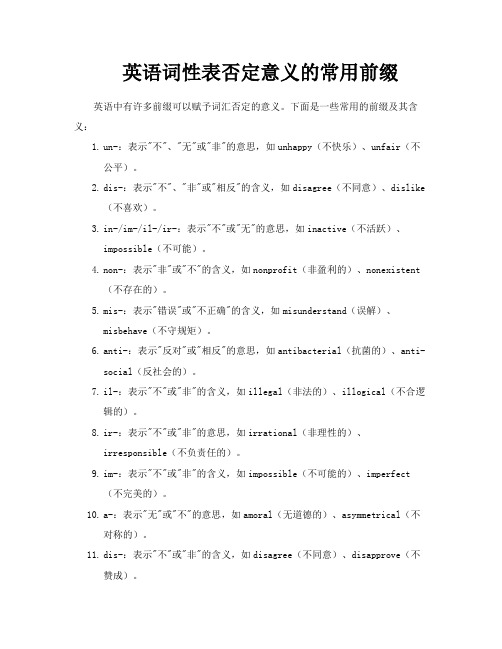
英语词性表否定意义的常用前缀英语中有许多前缀可以赋予词汇否定的意义。
下面是一些常用的前缀及其含义:1.un-:表示"不"、"无"或"非"的意思,如unhappy(不快乐)、unfair(不公平)。
2.dis-:表示"不"、"非"或"相反"的含义,如disagree(不同意)、dislike(不喜欢)。
3.in-/im-/il-/ir-:表示"不"或"无"的意思,如inactive(不活跃)、impossible(不可能)。
4.non-:表示"非"或"不"的含义,如nonprofit(非盈利的)、nonexistent(不存在的)。
5.mis-:表示"错误"或"不正确"的含义,如misunderstand(误解)、misbehave(不守规矩)。
6.anti-:表示"反对"或"相反"的意思,如antibacterial(抗菌的)、anti-social(反社会的)。
7.il-:表示"不"或"非"的含义,如illegal(非法的)、illogical(不合逻辑的)。
8.ir-:表示"不"或"非"的意思,如irrational(非理性的)、irresponsible(不负责任的)。
9.im-:表示"不"或"非"的含义,如impossible(不可能的)、imperfect(不完美的)。
10.a-:表示"无"或"不"的意思,如amoral(无道德的)、asymmetrical(不对称的)。
否定前缀un in im的规则
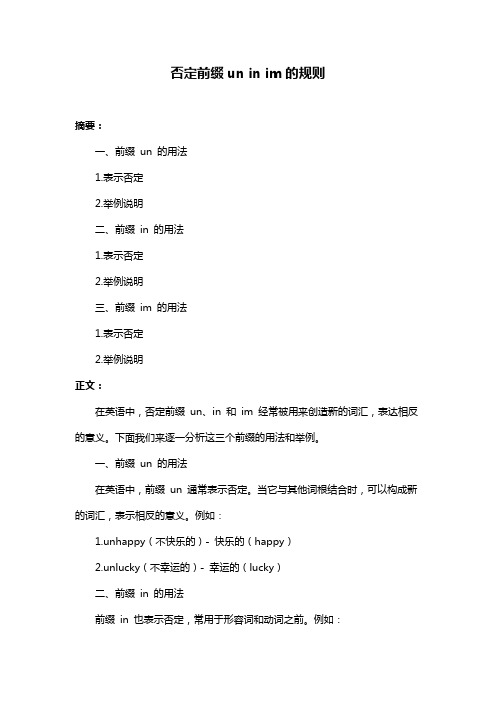
否定前缀un in im的规则
摘要:
一、前缀un 的用法
1.表示否定
2.举例说明
二、前缀in 的用法
1.表示否定
2.举例说明
三、前缀im 的用法
1.表示否定
2.举例说明
正文:
在英语中,否定前缀un、in 和im 经常被用来创造新的词汇,表达相反的意义。
下面我们来逐一分析这三个前缀的用法和举例。
一、前缀un 的用法
在英语中,前缀un 通常表示否定。
当它与其他词根结合时,可以构成新的词汇,表示相反的意义。
例如:
1.unhappy(不快乐的)- 快乐的(happy)
2.unlucky(不幸运的)- 幸运的(lucky)
二、前缀in 的用法
前缀in 也表示否定,常用于形容词和动词之前。
例如:
1.incorrect(不正确的)- 正确的(correct)
2.incapable(无能力的)- 有能力的(capable)
三、前缀im 的用法
前缀im 同样表示否定,它主要出现在形容词和动词之前。
例如:
1.impossible(不可能的)- 可能的(possible)
2.imbecile(愚蠢的)- 聪明的(intelligent)
以上就是英语中否定前缀un、in 和im 的用法及举例。
15个否定前缀

15个否定前缀在英语中,否定前缀是一种很重要的语法元素,它可以改变一个词的意义,使其表示否定。
常见的否定前缀包括un-, dis-, in-, im-等等。
今天,我们来看看15个常见的否定前缀,并探讨它们的用法和例句。
1. Un-Un-是最常见的否定前缀之一,它表示"不"或"没有"的意思。
比如,unhappy意为"不开心",undone意为"未完成的"。
2. Dis-Dis-表示"相反"或"不正确"。
例如,disconnect意为"断开",disapprove意为"反对"。
3. In-In-在某些情况下表示否定,但在其他情况下表示"进入"或"内部的"。
例如,inaccurate意为"不准确的",inflow意为"流入"。
4. Im-Im-和in-具有相似的含义,表示否定或"不"。
例如,impatient意为"不耐烦的",imperfect意为"不完美的"。
5. Il-Il-是表示否定的前缀,通常用于以-l开头的词。
例如,illegal意为"非法的",illogical意为"不合逻辑的"。
6. Ir-Ir-是表示否定的前缀,通常用于以-r开头的词。
例如,irresponsible意为"不负责任的",irregular意为"不规则的"。
7. Un-Un-在有些情况下表示"不",而在其他情况下表示"解除"。
例如,unkind意为"不友善的",unlock意为"解锁"。
否定词缀的单词
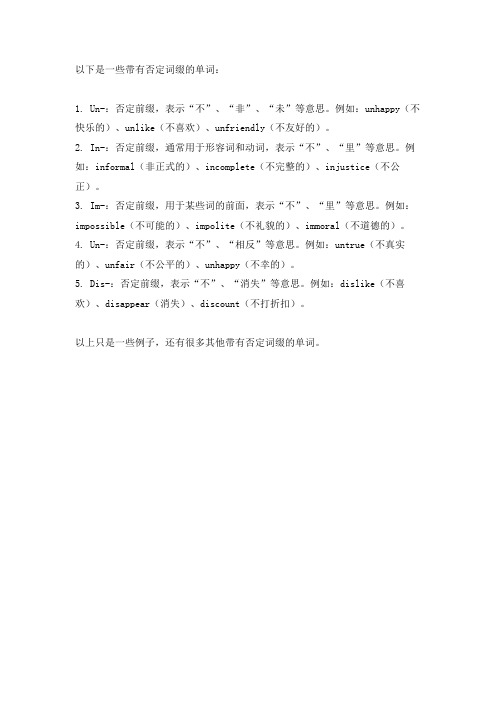
以下是一些带有否定词缀的单词:
1. Un-:否定前缀,表示“不”、“非”、“未”等意思。
例如:unhappy(不快乐的)、unlike(不喜欢)、unfriendly(不友好的)。
2. In-:否定前缀,通常用于形容词和动词,表示“不”、“里”等意思。
例如:informal(非正式的)、incomplete(不完整的)、injustice(不公正)。
3. Im-:否定前缀,用于某些词的前面,表示“不”、“里”等意思。
例如:impossible(不可能的)、impolite(不礼貌的)、immoral(不道德的)。
4. Un-:否定前缀,表示“不”、“相反”等意思。
例如:untrue(不真实的)、unfair(不公平的)、unhappy(不幸的)。
5. Dis-:否定前缀,表示“不”、“消失”等意思。
例如:dislike(不喜欢)、disappear(消失)、discount(不打折扣)。
以上只是一些例子,还有很多其他带有否定词缀的单词。
英语中表示否定的前缀

1、纯粹表示否定得前缀
(1)
前缀 a-,an-
用法 加在名词,形容词上
例词 原词
否定
moral
amoral 与道德无关得
sexual
asexual
onoma=name anonymous 匿名得
1、纯粹表示否定得前缀
(2)
前缀 用法 例词
dis-
加在名词,形容词与动词上
原词
否定
advantage disadvantage劣势
例词
mis-
大多用于动词,也用于动名词与名 词
原词
否定
judge
misjudge
understand misunderstand
deed
misdeed
dealing
misdealing
3、表示“反动作”得前缀
(1)
前缀 用法
例词
de-
加在动词,尤其就就是以ate-,ize-结尾得 外来动词上
原词
否定
polite
impolite
regular
irregular
1、纯粹表示否定得前缀
(4)
前缀 un-
用法 例词
用于大多数得形容词及其派生副 词与名词上
原词
否定
necessary unnecessary
employment unemployment
1、纯粹表示否定得前缀
注意:
①有些形容词,或则有其常用得反义词,表示明确 得含义,或则本身已具有否定意义,就不用un-,我 们不说ungood,unbad,unsmall。凡遇到这种情 形,不就是用反义词而就是用副词not。因为un-并 不等于not,而且具有贬抑意味。比较:not beautiful(不美),unbeautiful(难瞧)。
史上最全面英语中常用否定前缀后缀的使用规律
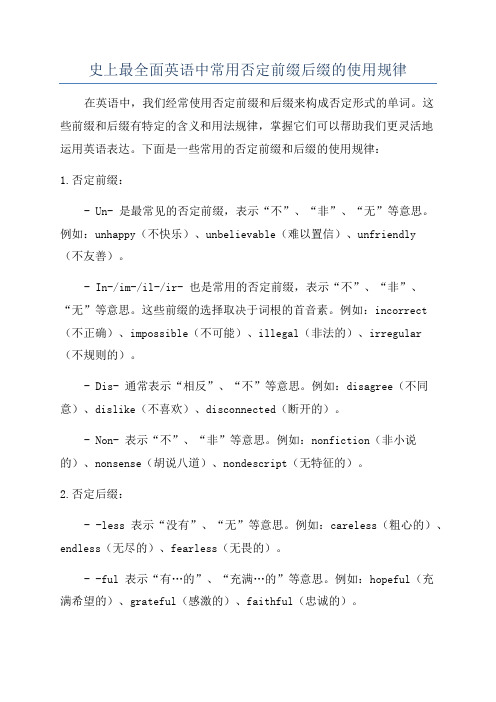
史上最全面英语中常用否定前缀后缀的使用规律在英语中,我们经常使用否定前缀和后缀来构成否定形式的单词。
这些前缀和后缀有特定的含义和用法规律,掌握它们可以帮助我们更灵活地运用英语表达。
下面是一些常用的否定前缀和后缀的使用规律:1.否定前缀:- Un- 是最常见的否定前缀,表示“不”、“非”、“无”等意思。
例如:unhappy(不快乐)、unbelievable(难以置信)、unfriendly(不友善)。
- In-/im-/il-/ir- 也是常用的否定前缀,表示“不”、“非”、“无”等意思。
这些前缀的选择取决于词根的首音素。
例如:incorrect (不正确)、impossible(不可能)、illegal(非法的)、irregular(不规则的)。
- Dis- 通常表示“相反”、“不”等意思。
例如:disagree(不同意)、dislike(不喜欢)、disconnected(断开的)。
- Non- 表示“不”、“非”等意思。
例如:nonfiction(非小说的)、nonsense(胡说八道)、nondescript(无特征的)。
2.否定后缀:- -less 表示“没有”、“无”等意思。
例如:careless(粗心的)、endless(无尽的)、fearless(无畏的)。
- -ful 表示“有…的”、“充满…的”等意思。
例如:hopeful(充满希望的)、grateful(感激的)、faithful(忠诚的)。
- -free 表示“免费”、“不含…”等意思。
例如:gluten-free(不含麸质的)、sugar-free(无糖的)、duty-free(免税的)。
- -able/-ible/-ible 表示“能够…”、“可能…”等意思。
-able通常用在动词后,-ible/-ible 通常用在名词后。
例如:washable(可洗的)、audible(可听见的)、flexible(灵活的)。
- -dis-/-il-/-im-/-in- 表示“不”、“非”等意思。
五个常见英语否定前缀用法辨析

五个常见英语否定前缀用法辨析美国当代著名语法学家R·Quirk在他与人合著的 A Grammar of Contemporary English一书中对英语前缀作了科学的分类。
他划分出的5个否定前缀(negative prefix)分别为:un-,in-(其中包括il-, im-,ir-),non-,dis-,a-。
在英语教学中,时常遇到一些学生把这几个否定前缀张冠李戴,错误百出。
分析其原因,还是因为他们对每个否定前缀的含义、构成及用法不十分了解造成的。
本文拟就5个否定前缀的含义、构成及用法作简略的探讨和归纳,希望能有益于英语的教学和学习。
一、un-是来自英语本族语的前缀,其英文含义为not, the opposite of。
它是5个否定前缀中运用最为广泛的一个,构词能力相当强。
通常加在形容词、副词、名词、动词及分词之前,表示否定意义和相反的动作。
该词缀的用法有下列几种情形:1. un-加在词头为in-或im-的单词前。
a.加在in-前:uninfluential uninformative unintelligent unintentional unintelliglble uninterpretable uninteresting uninvolvedb.加在im-前:unimportant unimaginable unimpressible unimpressive unimproved unimagined2. un-加在以-able,-ful,-like,-ly,-some,-ing,-ed结尾的单词前。
a.加在-able结尾的词前:unfinishable undesirable unmatchable unexplainable unexpectable untranslatableb.加在-ful结尾的词前:unhealthful unfruitful unhelpful unmindfulunpainful unskillful unsucceessful unusefulc.加在-like结尾的词前:unstatesmanlike unsportsrnanliked.加在-some结尾的词前:unhandsome untroublesomee.加在-ly结尾的词前:unbrotherly unshapely unsightly unworldly unwomanly unmannerly f.加在-ing结尾的词前:unharming ungiving unloving unfeeling unmeaning unmoving g.加在-ed结尾的词前:unmoved unspoiled unhandled unfixed unexpressed unexpected3. un-还可以加在-ed分词+介词或副词的词前:unheard-of unhoped-for unmade-up uncared-for4. “un+名词+ful”形式的形容词常和“名词+less”形式的形容词表达相同的意思。
最新英文中常用否定前缀总结
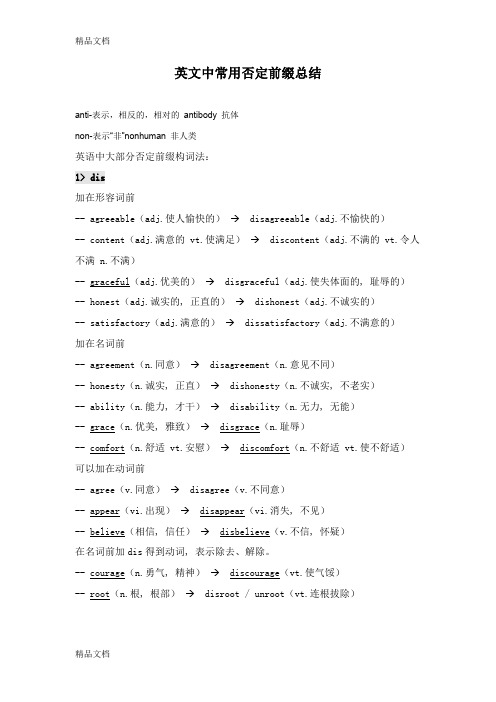
英文中常用否定前缀总结anti-表示,相反的,相对的antibody 抗体non-表示“非”nonhuman 非人类英语中大部分否定前缀构词法:1> dis加在形容词前-- agreeable(adj.使人愉快的)→ disagreeable(adj.不愉快的)-- content(adj.满意的 vt.使满足)→ discontent(adj.不满的 vt.令人不满 n.不满)-- graceful(adj.优美的)→ disgraceful(adj.使失体面的, 耻辱的)-- honest(adj.诚实的, 正直的)→ dishonest(adj.不诚实的)-- satisfactory(adj.满意的)→ dissatisfactory(adj.不满意的)加在名词前-- agreement(n.同意)→ disagreement(n.意见不同)-- honesty(n.诚实, 正直)→ dishonesty(n.不诚实, 不老实)-- ability(n.能力, 才干)→ disability(n.无力, 无能)-- grace(n.优美, 雅致)→ disgrace(n.耻辱)-- comfort(n.舒适 vt.安慰)→ discomfort(n.不舒适 vt.使不舒适)可以加在动词前-- agree(v.同意)→ disagree(v.不同意)-- appear(vi.出现)→ disappear(vi.消失, 不见)-- believe(相信, 信任)→ disbelieve(v.不信, 怀疑)在名词前加dis得到动词, 表示除去、解除。
-- courage(n.勇气, 精神)→ discourage(vt.使气馁)-- root(n.根, 根部)→ disroot / unroot(vt.连根拔除)-- mask(n.面具, 掩饰 v.戴面具, 掩饰)→ unmask / dismask(vt.揭露, 暴露)-- burden(n.担子, 负担 v.负担)→ disburden(v.解除负担)2>il -- 加在以i开头的形容词之前-- legal(adj.法律的, 法定的)→ illegal(adj.违法的)-- logical(adj.合乎逻辑的)→ illogical(adj.不合逻辑的)-- literate(adj.有文化的 n.学者)→ illiterate(adj.没受教育的 n.文盲)3>im -- 加在以b, m, p开头的形容词之前-- possible(adj.可能的)→ impossible(adj.不可能的)-- mortal(adj.必死的, 人类的)→ immortal(adj.不朽的)-- moral(adj.道德的)→ immoral(adj.不道德的)-- balanced(adj.平衡的)→ imbalanced(adj.不平衡的)-- balance (n.平衡)→ imbalance(n.不平衡)4>ir -- 加在以r开头的形容词之前-- regular(adj.规则的)→ irregular(adj.不规则的)-- rational(adj.理性的)→ irrational(adj.无理性的)-- resistible(adj.可抵抗的)→ irresistlble(adj.不可抵抗的)5>in --主要用于其它字母开头的词之前-- human(adj.人性的)→ inhuman(adj.野蛮的)-- correct(adj.正确的)→ incorrect(adj.不正确的)-- justice(n.正义, 公平)→ injustice(n.不正义, 不公平)-- sincere(adj.真诚的)→ insincere(adj.虚假的, 不真诚的)6>un --只能用于形容词和动词之前不-- happy(adj.快乐的)→ unhappy(adj.不幸的, 不快乐的)-- friendly(adj.友好的)→ unfriendly(adj.不友好的)-- lucky(adj.幸运的)→ unlucky(adj.不幸的)无-- conditional(adj.有条件的)→ unconditional(adj.无条件的)-- limited(adj.有限的)→ unlimited(adj.无限的)非-- official(adj.官方的, 正式的)→ unofficial(adj.非官方的, 非正式的)-- just(adj.正义的, 公正的)→ unjust(adj.不公平的)未(主要用于过去分词之前)-- undecided(adj.未定的)→ unfinished(adj.未完成的)-- unexpected(adj.未预料到)→ unhurt(adj.没有受伤的)用于动词之前表示做相反的动作-- lock(v.锁, 锁上)→ unlock(vt.开...锁)-- tie(vt.系, 打结)→ untie(vi.松开, 解开)-- cover(vt.覆盖)→ uncover(vt.揭开, 揭露)-- pack(vt.包装)→ unpack(v.打开包裹)-- dress(v.穿衣)→ undress(vt.使脱衣服)-- load(v.装载)→ unload(v.卸货)Exercise:1> polite(adj.有礼貌的)→ impolite(adj.无礼的, 粗鲁的)2> agree → disagree3> legible(adj.清晰的, 易读的)→ illegible(adj.难辨认的, 字迹模糊的)4> accurate(adj.正确的, 精确的)→ inaccurate(adj.错误的, 不准确的)5> locked → unlocked6> regular → irregular否定前缀填空1. You will be_____________ (able) to pass the exam if you don’t study hard.2. There are lots of ________ (common) kinds of birds in Zhalong. Many people like to go birdwatching there.3. It is ___________ (necessary) for you to walk the little dog once a week to the park.4. It is ___________ (important) to keep quiet when you watch the birds and insects.5. He feels _________(happy) because he lost his wallet.6. There is a ________ (regular) rain in Sahara desert every year.7. Is it __________(possible) to get to the city by train?8. Some people are ___________ ( friendly) to birds. They throw stones to them.9. Some people feel ____ (happy) that government give poor people such small and ____(comfortable) flats.10. It is _______ (safe) to walk on the street at night.11. We should keep students staying away from the ________ (healthy) books.12. These trainers are too small. They are ______________(comfortable) to wear.13. If someone does not show good manners to others, he is ____________(polite).14. Jim never tells lies and he is an ___________ (honest) boy.15. This girl is so __________(care) that she often makes mistakes in her homework.◇江苏13城市中考试题汇编◇1. It's ________(friendly) of him to say such bad words to his classmates. (08常州)2. Don't get _________(patient) about your personal trouble. (08无锡)3. He seemed ______(friend) at first, but now I've got to know him and I realize he's warm and kind. (08徐州)4. If someone doesn't show good manners to others, he or she is __________(polite). (08宿迁)5. It’s so ___________(不公平的)! Mary gets more money for less work. (09镇江)6. The basketball team was __________(luck) to lose in the final minute of the game. (09徐州)7. In some ways, the space shuttles travel fast, but the journey to Mars may be very___(comfortable). (09泰州)8. it’s ___________(possible) for us to finish so much work within so little time. We need help. (2010南通)9. Simon is such a __________(honest) person that no one believes him. (2010扬州)10. Don’t be ________(patient)! You should listen to what he is saying first. (2010常州)11. It is _________(possible) for me to design the poster without your help. (2010泰州)12. it’s not easy for those superstars to face ___________(无穷无尽的)interviews and doubts. (2010镇江)。
否定前缀的常用单词

否定前缀的常用单词一、un -1. unhappy.- 音标:[ʌnˈhæpi]- 词性:adj.(形容词)- 含义:不快乐的,悲伤的。
例如:He looks unhappy today.(他今天看起来不开心。
)2. unusual.- 音标:[ʌnˈjuːʒuəl]- 词性:adj.- 含义:不寻常的,与众不同的。
例如:This is an unusual plant.(这是一种不寻常的植物。
)3. unfair.- 音标:[ʌnˈfeə(r)]- 词性:adj.- 含义:不公平的。
例如:The decision is unfair.(这个决定是不公平的。
)4. unable.- 音标:[ʌnˈeɪbl]- 词性:adj.- 含义:不能的,不会的。
例如:He is unable to come to the party.(他不能来参加聚会。
)二、in -(在字母l前为il -,在字母m、p前为im -)1. inactive.- 音标:[ɪnˈæktɪv]- 词性:adj.- 含义:不活跃的,懒散的。
例如:He is an inactive boy.(他是一个懒散的男孩。
)2. illegal.- 音标:[ɪˈliːɡl]- 词性:adj.- 含义:非法的。
例如:It is illegal to hunt pandas.(猎杀熊猫是非法的。
)3. impossible.- 音标:[ɪmˈpɒsəbl]- 词性:adj.- 含义:不可能的。
例如:It is impossible for me to finish this work in one day.(对我来说一天内完成这项工作是不可能的。
)4. impolite.- 音标:[ˌɪmpəˈlaɪt]- 词性:adj.- 含义:不礼貌的。
例如:It is impolite to talk loudly in the library.(在图书馆大声说话是不礼貌的。
英语常见前缀的意思和用法
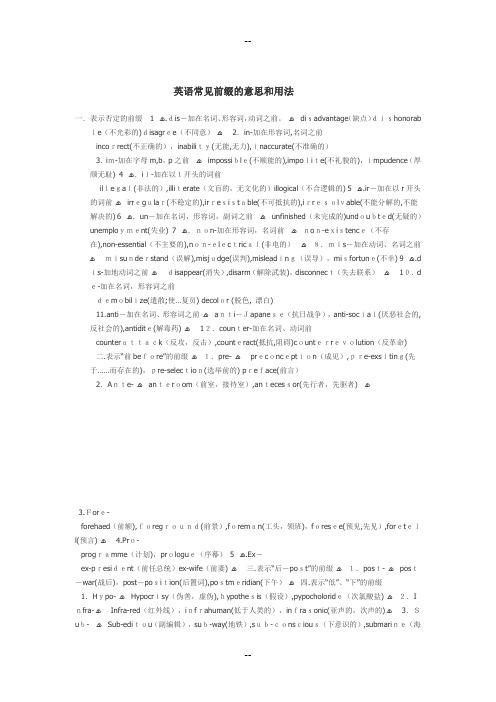
英语常见前缀的意思和用法1.dis-加在名词、形容词,动词之前。
ﻫdisadvantage(缺点)dishonorab 一.表示否定的前缀ﻫle(不光彩的)disagree(不同意)ﻫ2.in-加在形容词,名词之前incorrect(不正确的),inability(无能,无力),inaccurate(不准确的)3.im-加在字母m,b,p之前ﻫimpossible(不顺能的),impolite(不礼貌的),impudence(厚4.il-加在以1开头的词前颜无耻) ﻫ5.ir-加在以r开头illegal(非法的),illiterate(文盲的,无文化的)illogical(不合逻辑的) ﻫ的词前ﻫirregular(不稳定的),irresistable(不可抵抗的),irresolvable(不能分解的,不能6.un-加在名词,形容词,副词之前ﻫunfinished(未完成的)undoubted(无疑的)解决的) ﻫ7.non-加在形容词,名词前ﻫnon-existence(不存unemployment(失业) ﻫ在),non-essential(不主要的),non-electrical(非电的)ﻫ8.mis-加在动词、名词之前9.dﻫmisunderstand(误解),misjudge(误判),misleading(误导),misfortune(不幸) ﻫis-加地动词之前ﻫdisappear(消失),disarm(解除武装),disconnect(失去联系)ﻫ10.d e-加在名词,形容词之前demobilize(遣散;使…复员) decolor (脱色, 漂白)11.anti-加在名词、形容词之前ﻫanti-Japanese(抗日战争),anti-social(厌恶社会的,反社会的),antidite(解毒药) ﻫ12.counter-加在名词、动词前counterattack(反攻,反击),counteract(抵抗,阻碍)counterrevolution(反革命)二.表示“前before”的前缀ﻫ1.pre- ﻫpreconception(成见),pre-exsiting(先于……而存在的),pre-selection(选举前的) preface(前言)2.Ante- ﻫanteroom(前室,接待室),antecessor(先行者,先驱者)ﻫ3.Fore-forehaed(前额),foreground(前景),foreman(工头,领班),foresee(预见,先见),foretell(预言) ﻫ 4.Pro-5.Ex-programme(计划),prologue(序幕)ﻫex-president(前任总统)ex-wife(前妻) ﻫ三.表示“后-post”的前缀ﻫ1.post- ﻫpost-war(战后),post-position(后置词),postmeridian(下午)ﻫ四.表示“低”、“下”的前缀1.Hypo- ﻫHypocrisy(伪善,虚伪),hypothesis(假设),pypocholoride(次氯酸盐) ﻫ2.I nfra- ﻫInfra-red(红外线),infrahuman(低于人类的),infrasonic(亚声的,次声的) ﻫ3.Sub-ﻫSub-editou(副编辑),sub-way(地铁),sub-conscious(下意识的),submarine(海下的),subtropical(亚热带的),subtitle(副标题)五.表示“回”、“再次”、“向后”的前缀1.Re-ﻫRefuel(给…加油),retranslate(再译),reinforce(加强),reconstruct(重建),return(返回)ﻫ2.Retro-Retrograde(倒退的),retrospect(回顾)1.Co- ﻫco-exist(共存),co-operate(合作),co-educati六.表示“共同”、“和”的前缀ﻫon(男女同校) ﻫ七.表示“相互”、“之间”的前缀1.Inter-Interchangeble(可互换的),interdipendert(互相依靠的),international(国际的),inter-national(交往)1.Ec-八.表示“出”、“超出”的前缀ﻫEclipse(蚀),ecstasy(狂想)ﻫ2.Extra-ﻫExtraordinary(非凡的),extramural(校外的),extrasensory(超感觉的)1.hyper-, preter-, super-, sur-,ultra-九.表示“超过”的前缀ﻫhyper-sensitive(过敏的),preterhuman(超人的)十.其它的前缀ﻫ1.auto-自2.mal-坏,恶automatic(自动的),auto-autobilgraphy(自传)ﻫMalnutrition(营养不良),maltreat(虐待)3.Micro-ﻫMicroscope(显微镜),microtome(切片机)ﻫ4.Tele-远Telegram(电报),telephone(电话),telescope(望远镜)5.Demi-,semi-hemi-6.Uni-, mono-(单一, 单Semi-circle(半圆),hemisphere(半球),demilune(半月,新月)ﻫ独)ﻫMonotone(单调),monologue(独白),uniform(制服)7.Bi-,di-二ﻫBiyearly(二年一次的),biweekly(二周一次的),dichloride(二氯化物)ﻫ8.Tr i-三ﻫTriangle(三角),tripld(三角架)10.Poly –多9.Multi-多ﻫmulti-colored(颜色多样的),multi-national(多国的)ﻫPolygon(多角形),polytomic(多原子的)ﻫ11.Arch-首领archbishop(大主教),architect(建筑师)12.bene-善,好benefit(利益),benevolence(善意)ﻫ13.homo-同ﻫhomosexual(同性恋的),homogr aph(同形异义字)ﻫ14.neo新ﻫneo-colonialism(新殖民主义),neolithic(新石器时代的)ﻫ15.ortho-正确,直orthogonal(直角的),orthodox(正统) ﻫ16.philo-挚爱17.proto-原始philosopher(哲学家) ﻫprotohydrogen(初氢),prototype(原型),protoplasm(原生质)ﻫ18.pseudo-假的, 伪的, 冒充的pseudonym(匿名),pseudo-communism(假共产主义)19.a-,ab-,abs-(只有在t,c之前)从,自ﻫavoid(避免),absent(缺少的),abstain(抑制),abstract(吸引)20.Apo-,aph-来自apology(道歉,谢罪),apostle(倡言者,先驱)ﻫ21.se-分离ﻫseparation(分开),secure (安全的),sedition(煽动叛乱)22.para-防ﻫparachute(降落伞),23.omni-所有的,公共的omnibus(公共汽车),omnipotence(万能)ﻫ24.pan-全,泛25.panto-Pan-American(全美的),pancean(万灵药),panorama(风景的全貌;万花筒) ﻫ全pantisocracy(乌托邦大同世界),pantoscopic(视野广大)26.dia-通过,借以diagonal(对角的),diagnosis(诊断),dialogue(对话)27.Per-通过,彻底,不利perambrlate(走来走去),perfect极好的28.trans-通过,横过transcript(抄本, 副本; 记录),translation(翻译),trxnsparent(透明的),transport(运输),trans-plant(移植)29.Com-,con-,cor-,col-共同,和,完全comment(评论),compile(编辑),correlation(相互关系),collect(收集),corruption(贪污腐败),collaborate(合作,合著)30.syn-共同synonym(同义词),synchronization(同步),syntonic(谐振的),synthetic(人工的,合成的)ﻫ31.meta-和,在……之后ﻫmetaphor(比喻),metaphysics(形而上学)ﻫ32.C is-在这一边cisatlantic(大西洋这边的)33.pen-几乎,相近peninsular(.住在半岛上的居民,半岛(状)的, 形成半岛的) ﻫ34.en-,em-往……里,使……ﻫencamp(扎营),enable(使……能),endear(使……受喜爱),embrace(拥抱,抓住(机会))35.intro内在intracardiac(心脏内部的),intramolecular(分子内部的),intracelular(细胞内部的)37.dys-坏ﻫdyspep ﻫ36.intro-到……中ﻫintroduce(介绍),introspect(反省,内省)ﻫsia(消化不良),dysentry(痢疾)38.Eu-优,美好ﻫeulogy(颂词),euphony(悦耳的声音) ﻫ39.ambi-,amphi-两者40.penta-amphibian(两栖的),ambidextrous(两只手都很灵巧的;心怀二意的;非常灵巧的)ﻫ五pentagon(五角大楼),pentagram(五角星),pentameter(五步诗句)41.sex-六sexangle(六角),sexennial(六年一度的)42. sept-七ﻫSeptember九月(古罗马的七月),septennial(七年一度)44.octa-,octo,oct八43.hepta-七ﻫheptab(七个成套之物),heptagon(七角形) ﻫﻫoctagon(八角形),octuple(八倍)October (十月)ﻫ45.nona-,ennea-九46.deci-,deca-十ﻫdecimal(十进位的),decnonagon(九角形),ennead(九个一组) ﻫagramme(十克)47.centi-百ﻫcentimeter(厘米),centipede(蜈蚣)48.milli-千ﻫmillenias(千年的),millimeter(毫米)ﻫ49.Kilo-千kilowatt(千瓦),kilometer(千米)ﻫ。
五个常见英语否定前缀用法辨析
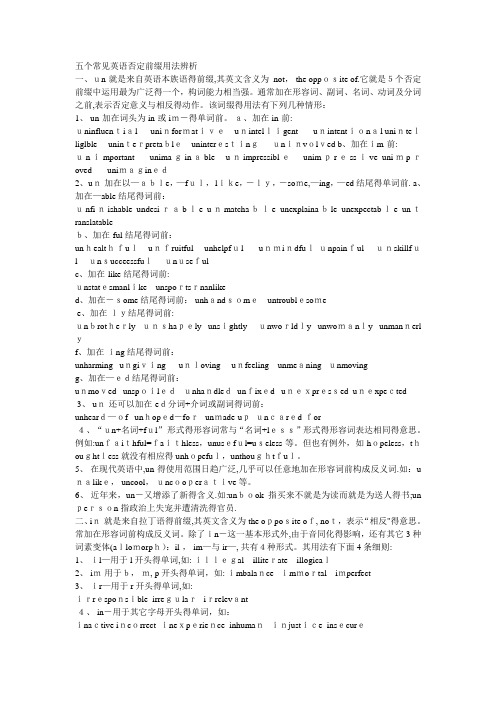
五个常见英语否定前缀用法辨析一、un-就是来自英语本族语得前缀,其英文含义为not, the opposite of.它就是5个否定前缀中运用最为广泛得一个,构词能力相当强。
通常加在形容词、副词、名词、动词及分词之前,表示否定意义与相反得动作。
该词缀得用法有下列几种情形:1、 un-加在词头为in-或im-得单词前。
a、加在in-前:uninfluential uninformative unintelligent unintentional unintelliglble uninterpretable uninterestinguninvolved b、加在im-前:unimportant unimaginable unimpressible unimpressive unimproved unimagined2、 un-加在以—able,—ful,-like,-ly,-some,—ing,—ed结尾得单词前. a、加在—able结尾得词前:unfinishable undesirable unmatchable unexplainable unexpectable untranslatableb、加在-ful结尾得词前:unhealthful unfruitful unhelpful unmindfulunpainful unskillful unsucceessfulunusefulc、加在-like结尾得词前:unstatesmanlike unsportsrnanliked、加在-some结尾得词前: unhandsome untroublesomee、加在-ly结尾得词前:unbrotherly unshapely unsightly unworldly unwomanly unmannerl yf、加在-ing结尾得词前:unharming ungiving unloving unfeeling unmeaning unmovingg、加在—ed结尾得词前:unmoved unspoiledunhandled unfixed unexpressed unexpected3、 un-还可以加在-ed分词+介词或副词得词前:unheard—of unhoped-for unmade-upuncared-for4、“un+名词+ful”形式得形容词常与“名词+less”形式得形容词表达相同得意思。
五个常见英语否定前缀用法辨析精编版
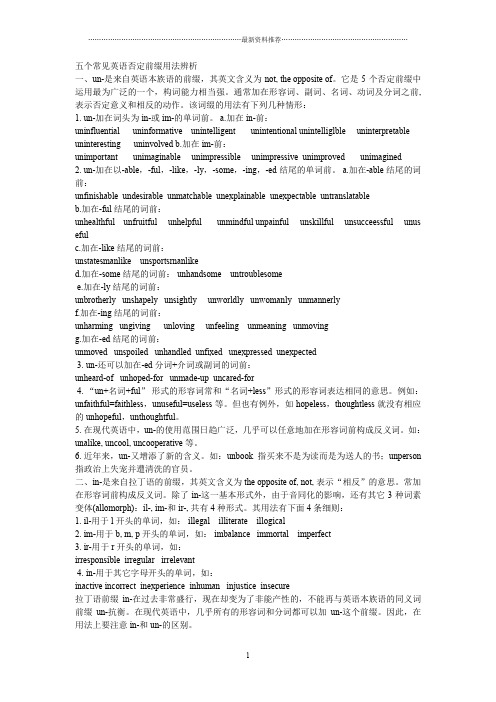
五个常见英语否定前缀用法辨析一、un-是来自英语本族语的前缀,其英文含义为not, the opposite of。
它是5个否定前缀中运用最为广泛的一个,构词能力相当强。
通常加在形容词、副词、名词、动词及分词之前,表示否定意义和相反的动作。
该词缀的用法有下列几种情形:1. un-加在词头为in-或im-的单词前。
a.加在in-前:uninfluential uninformative unintelligent unintentional unintelliglble uninterpretable uninteresting uninvolved b.加在im-前:unimportant unimaginable unimpressible unimpressive unimproved unimagined2. un-加在以-able,-ful,-like,-ly,-some,-ing,-ed结尾的单词前。
a.加在-able结尾的词前:unfinishable undesirable unmatchable unexplainable unexpectable untranslatableb.加在-ful结尾的词前:unhealthful unfruitful unhelpful unmindful unpainful unskillful unsucceessful unus efulc.加在-like结尾的词前:unstatesmanlike unsportsrnanliked.加在-some结尾的词前: unhandsome untroublesomee.加在-ly结尾的词前:unbrotherly unshapely unsightly unworldly unwomanly unmannerlyf.加在-ing结尾的词前:unharming ungiving unloving unfeeling unmeaning unmovingg.加在-ed结尾的词前:unmoved unspoiled unhandled unfixed unexpressed unexpected3. un-还可以加在-ed分词+介词或副词的词前:unheard-of unhoped-for unmade-up uncared-for4. “un+名词+ful”形式的形容词常和“名词+less”形式的形容词表达相同的意思。
英语中有许多表示否定的前缀
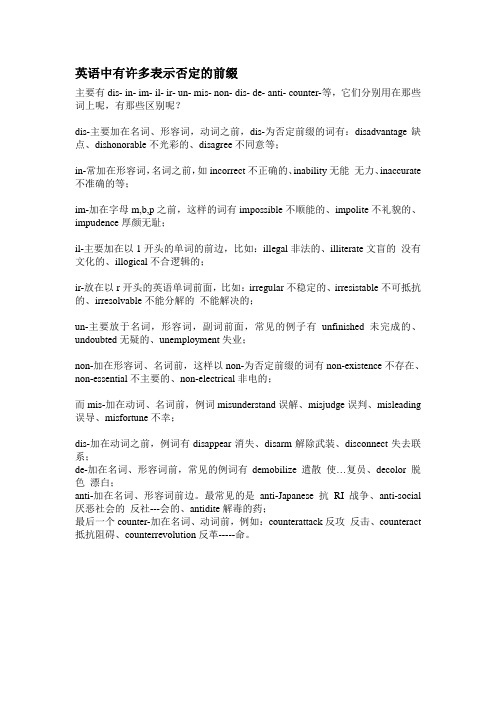
英语中有许多表示否定的前缀主要有dis- in- im- il- ir- un- mis- non- dis- de- anti- counter-等,它们分别用在那些词上呢,有那些区别呢?dis-主要加在名词、形容词,动词之前,dis-为否定前缀的词有:disadvantage缺点、dishonorable不光彩的、disagree不同意等;in-常加在形容词,名词之前,如incorrect不正确的、inability无能无力、inaccurate 不准确的等;im-加在字母m,b,p之前,这样的词有impossible不顺能的、impolite不礼貌的、impudence厚颜无耻;il-主要加在以1开头的单词的前边,比如:illegal非法的、illiterate文盲的没有文化的、illogical不合逻辑的;ir-放在以r开头的英语单词前面,比如:irregular不稳定的、irresistable不可抵抗的、irresolvable不能分解的不能解决的;un-主要放于名词,形容词,副词前面,常见的例子有unfinished未完成的、undoubted无疑的、unemployment失业;non-加在形容词、名词前,这样以non-为否定前缀的词有non-existence不存在、non-essential不主要的、non-electrical非电的;而mis-加在动词、名词前,例词misunderstand误解、misjudge误判、misleading 误导、misfortune不幸;dis-加在动词之前,例词有disappear消失、disarm解除武装、disconnect失去联系;de-加在名词、形容词前,常见的例词有demobilize遣散使…复员、decolor 脱色漂白;anti-加在名词、形容词前边。
最常见的是anti-Japanese抗RI 战争、anti-social 厌恶社会的反社---会的、antidite解毒的药;最后一个counter-加在名词、动词前,例如:counterattack反攻反击、counteract 抵抗阻碍、counterrevolution反革-----命。
英文否定前缀
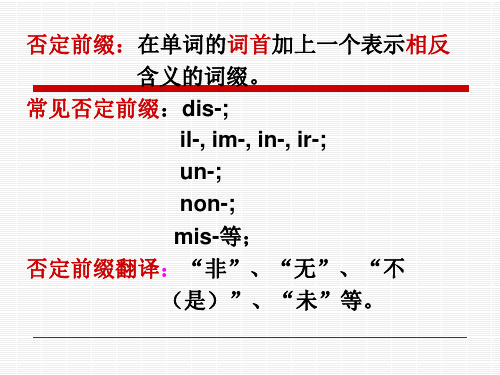
那个受伤的人不能走路,所以他得被人背着。
24.He was _u_n_a_b_l_e__ (ability) to sleep at night
because of his anxiety.由于焦虑,晚上他不能入睡。
25.The fish is a bit _s_m__e_ll_y__ (smell). We can't eat
ambassador had been arrested for spying.
政府公开另一个外交大使园间谍罪被逮捕。
6.His identity is u_n__k_n_o_w__n(know) to us so we
have to confirm.他的身份为我们所不知,所以我们 得证实。
7.He seems to be u__n_a_w__a_r_e (aware)of the trouble
un-未(主要用于过去分词之前)
unexpected 未预料到) unlocked 未上锁的 uneducated 未受教育的 undecided 未决定的 unfinished 未完成的 uncrowded 不拥挤的 undoubted 无疑的 unmarried 未结婚的
4.non-加在名、形、副或作形容词的分词前, 表“无,抗,防,非,没”之意
nonsense(n.胡说、废话) non-violent(adj.非暴力的 ) nonpoisonous无毒的 nonexistent不存在的 nonsmoking 不准吸烟的 nonstop a.直达的
5.ab-,ab-加在词根前,表示"相反,离去” 如:
abnormal(ab+normal 正常的)反常的 abuse滥用、错误使用、虐待
否定前缀un in im的规则

否定前缀un in im的规则
摘要:
一、前缀un 的规则
1.表示“不”或“无”的意思
2.用于名词和动词的否定形式
3.特殊情况下,与其他前缀结合使用
二、前缀im 的规则
1.表示“不”或“无”的意思
2.用于名词和动词的否定形式
3.特殊情况下,与其他前缀结合使用
正文:
在英语中,否定前缀un 和im 经常被用来表示“不”或“无”的意思。
它们可以用于名词和动词的否定形式,也可以与其他前缀结合使用。
一、前缀un 的规则
使用前缀un 时,它通常表示“不”或“无”的意思。
例如,“unhappy”表示“不快乐的”,“unable”表示“不能的”。
此外,un 还可以与其他前缀结合使用,例如“disunited”表示“不团结的”。
二、前缀im 的规则
前缀im 与un 相似,也表示“不”或“无”的意思。
例如,“impossible”表示“不可能的”,“impatient”表示“不耐烦的”。
同样,im 也可以与其他前缀结合使用,例如“diminish”表示“减少”。
需要注意的是,虽然un 和im 都表示否定意义,但它们在某些情况下可能有所不同。
在某些情况下,un 可能更倾向于表示“不”,而im 可能更倾向于表示“无”。
然而,这并不是绝对的,具体用法还需要根据上下文来判断。
总结来说,前缀un 和im 在英语中表示否定意义,它们可以用于名词和动词的否定形式,也可以与其他前缀结合使用。
最新英文中常用否定前缀总结
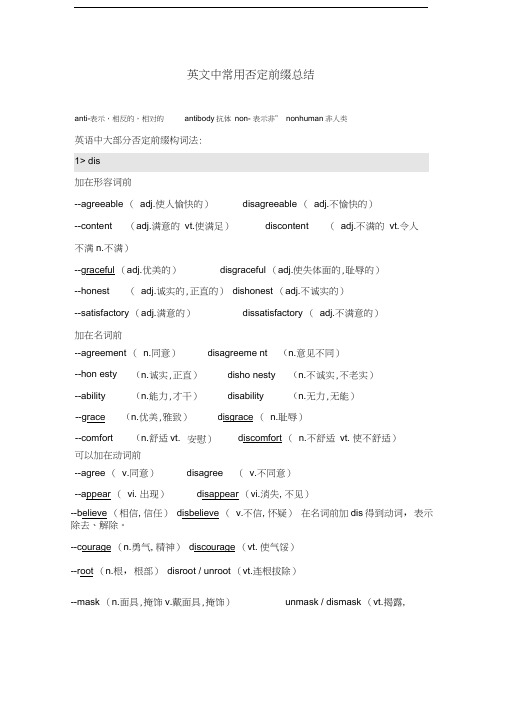
英文中常用否定前缀总结anti-表示,相反的,相对的antibody抗体non- 表示非” nonhuman非人类英语中大部分否定前缀构词法:加在形容词前--agreeable (adj.使人愉快的)disagreeable (adj.不愉快的)--content (adj.满意的vt.使满足)discontent (adj.不满的vt.令人不满n.不满)--graceful (adj.优美的)disgraceful (adj.使失体面的,耻辱的)--honest (adj.诚实的,正直的)dishonest (adj.不诚实的)--satisfactory (adj.满意的)dissatisfactory (adj.不满意的)加在名词前--agreement (n.同意)disagreeme nt (n.意见不同)--hon esty (n.诚实,正直)disho nesty (n.不诚实,不老实)--ability (n.能力,才干)disability (n.无力,无能)--grace (n.优美,雅致)disgrace (n.耻辱)--comfort (n.舒适vt. 安慰)discomfort (n.不舒适vt. 使不舒适)可以加在动词前--agree (v.同意)disagree (v.不同意)--appear (vi. 出现)disappear (vi.消失, 不见)--believe (相信, 信任)disbelieve (v.不信, 怀疑)在名词前加dis得到动词,表示除去、解除。
--courage (n.勇气, 精神)discourage (vt. 使气馁)--root (n.根,根部)disroot / unroot (vt.连根拔除)--mask (n.面具,掩饰v.戴面具,掩饰)unmask / dismask (vt.揭露,--burden (n.担子,负担v.负担)disburden (v.解除负担)2>il --加在以i开头的形容词之前--legal (adj.法律的,法定的)illegal (adj.违法的)--logical (adj.合乎逻辑的)illogical (adj.不合逻辑的)--literate (adj.有文化的n.学者)illiterate (adj.没受教育的n. 文盲)3>im --加在以b, m, p开头的形容词之前--possible (adj.可能的)impossible (adj.不可能的)--mortal (adj.必死的,人类的)immortal (adj.不朽的)--moral (adj.道德的)immoral (adj 不道德的)--balaneed (adj.平衡的)imbala(adj.不平衡的)need--bala nee (n.平衡)imbala nee (n.不平衡)4>ir --加在以r开头的形容词之前--regular (adj.规则的)irregular (adj.不规则的)--rati onal (adj.理性的)irrati onal (adj.无理性的)--resistible (adj.可抵抗的)irresistible (adj.不可抵抗的)5>in --主要用于其它字母开头的词之前--huma n (adj.人性的)in huma n (adj 野蛮的)--correct (adj.正确的)in correct (adj.不正确的)--justice (n.正义,公平)injustice (n.不正义,不公平)--sin cere (adj.真诚的)insin cere (adj.虚假的,不真诚的)6>un --只能用于形容词和动词之前不--happy (adj.快乐的)un happy (adj 不幸的,不快乐的)--frie ndly (adj.友好的)unfrien dly (adj.不友好的)--lucky (adj.幸运的) unlucky (adj.不幸的)无--conditional (adj.有条件的) unconditional(adj.无条件的)--limited (adj.有限的) unlimited (adj.无限的)非用于动词之前表示做相反的动作 lock (v.锁,锁上)uniock (vt.开... 锁)tie (vt.系,打结)un tie(vi.松开, 解开)cover (vt.覆盖) uncover (vt.揭开, 揭露)pack (vt.包装) unpack ( v.打开包裹)dress (v.穿衣) un dress (vt.使脱衣服)load .(v.装载)uni oad (v .卸货)Exercise :1> polite (adj.有礼貌的) impolite (adj.无礼的,粗鲁的)2> agree disagree 3> legible (adj.清晰的,易读的)illegible(adj.难辨认的,字迹模糊的)4> accurate (adj.正确的,精确的) in accurate (adj.错误的,不准确的)5> locked uni ocked 6> regularirregular否定前缀填空1.You will be ____________ (able) to pass the exam if you don' t study hard.--official (adj.官方的,正式的) 的) unofficial (adj.非官方的,非正式--just(adj.正义的,公正的)未(主要用于过去分词之前) unjust (adj.不公平的)--undecided (adj.未定的) unfinished (adj.未完成的)--unexpected (adj.未预料至U ) unhurt (adj.没有受伤的)2. There are lots of _______ (com mon) kinds of birds in Zhal ong. Many people like to go birdwatchi ng there.3. It is __________ (n ecessary) for you to walk the little dog once a week to the park.4. It is __________ (importa nt) to keep quiet whe n you watch the birds and in sects.5. He feels _________ (happy) because he lost his wallet.6. There is a _______ (regular) rain in Sahara desert every year.7. Is it __________ (possible) to get to the city by train?8. Some people are ___________ ( frien dly) to birds. They throw stones to them.9. Some people feel _____ (happy) that government give poor people such small and___ (comfortable) flats.10. It is ________ (safe) to walk on the street at ni ght.11. We should keep stude nts stay ing away from the ______ (healthy) books.12. These trainers are too small. They are _____________ (comfortable) to wear.13. If some one does not show good manners to others, he is ___________ (polite).14. Jim n ever tells lies and he is an __________ (ho nest) boy.15. This girl is so __________ (care) that she ofte n makes mistakes in her homework.◊江苏13城市中考试题汇编◊1. It's _______ (frien dly) of him to say such bad words to his classmates. (08 常州)2. Don't get ________ (patient) about your personal trouble. (08 无锡)3. He seemed ______ (friend) at first, but now「ve got to know him and I realize he's warm and kind. (08 徐州)4. If some one does n't show good manners to others, he or she is _________ (polite). (08 宿迁)5. It ' s so _________ 公平的)! Mary gets more money for less work. (09 镇江)6. The basketball team was _________ (luck) to lose in the final minute of the game. (09 徐州)7. In some ways, the space shuttles travel fast, but the journey to Mars may bevery __ (comfortable). (09 泰州)8. it ' s ___________ (possible) for us to finish so much work with in so little time. We n eed help. (2010 南通)9. Simon is such a __________ (honest) person that no one believes him. (2010 扬州)10. Don' t be _______ (patient)! You should listen to what he is saying first. (2010 常州)11. It is ________ (possible) for me to design the poster without your help. (2010 泰州)12. it ' not easy for those superstars to face ______________ (无穷无尽的)interviewsand doubts. (2010 镇江)。
- 1、下载文档前请自行甄别文档内容的完整性,平台不提供额外的编辑、内容补充、找答案等附加服务。
- 2、"仅部分预览"的文档,不可在线预览部分如存在完整性等问题,可反馈申请退款(可完整预览的文档不适用该条件!)。
- 3、如文档侵犯您的权益,请联系客服反馈,我们会尽快为您处理(人工客服工作时间:9:00-18:30)。
五个常见英语否定前缀用法辨析
一、un-是来自英语本族语的前缀,其英文含义为not, the opposite of。
它是5个否定前缀中运用最为广泛的一个,构词能力相当强。
通常加在形容词、副词、名词、动词及分词之前,表示否定意义和相反的动作。
该词缀的用法有下列几种情形:
1. un-加在词头为in-或im-的单词前。
a.加在in-前:
uninfluential uninformative unintelligent unintentional unintelliglble uninterpretable uninteresting uninvolved b.加在im-前:
unimportant unimaginable unimpressible unimpressive unimproved unimagined
2. un-加在以-able,-ful,-like,-ly,-some,-ing,-ed结尾的单词前。
a.加在-able结尾的词前:
unfinishable undesirable unmatchable unexplainable unexpectable untranslatable
b.加在-ful结尾的词前:
unhealthful unfruitful unhelpful unmindful unpainful unskillful unsucceessful unus eful
c.加在-like结尾的词前:
unstatesmanlike unsportsrnanlike
d.加在-some结尾的词前: unhandsome untroublesome
e.加在-ly结尾的词前:
unbrotherly unshapely unsightly unworldly unwomanly unmannerly
f.加在-ing结尾的词前:
unharming ungiving unloving unfeeling unmeaning unmoving
g.加在-ed结尾的词前:
unmoved unspoiled unhandled unfixed unexpressed unexpected
3. un-还可以加在-ed分词+介词或副词的词前:
unheard-of unhoped-for unmade-up uncared-for
4. “un+名词+ful”形式的形容词常和“名词+less”形式的形容词表达相同的意思。
例如:unfaithful=faithless,unuseful=useless等。
但也有例外,如hopeless,thoughtless就没有相应的unhopeful,unthoughtful。
5. 在现代英语中,un-的使用范围日趋广泛,几乎可以任意地加在形容词前构成反义词。
如:unalike, uncool, uncooperative等。
6. 近年来,un-又增添了新的含义。
如:unbook指买来不是为读而是为送人的书;unperson 指政治上失宠并遭清洗的官员。
二、in-是来自拉丁语的前缀,其英文含义为the opposite of, not, 表示“相反”的意思。
常加在形容词前构成反义词。
除了in-这一基本形式外,由于音同化的影响,还有其它3种词素变体(allomorph):il-, im-和ir-, 共有4种形式。
其用法有下面4条细则:
1. il-用于l开头的单词,如: illegal illiterate illogical
2. im-用于b, m, p开头的单词,如: imbalance immortal imperfect
3. ir-用于r开头的单词,如:
irresponsible irregular irrelevant
4. in-用于其它字母开头的单词,如:
inactive incorrect inexperience inhuman injustice insecure
拉丁语前缀in-在过去非常盛行,现在却变为了非能产性的,不能再与英语本族语的同义词前缀un-抗衡。
在现代英语中,几乎所有的形容词和分词都可以加un-这个前缀。
因此,在用法上要注意in-和un-的区别。
(1)in-这个前缀来自拉丁语,因而明显地带有拉丁词尾-ate,-ant,-ent,-ite,-ible等的词用in-,例如:inappropriate,incessant,incoherent,indefinite,invisible,但也有例外的,如:unfortunate。
(2)以im-或in-为词头的单词不能再用in-,只能用un-,例如:unimaginable,unimpressive,uninfluential,unintelligent。
(3)以-able,-ed,-ful,-ing,-like,-ly,-some结尾的词多用un-,例如:unfashionable,unhatched,unsuccessful,unharming,unstatesmanlike,unworthily,untroublesome。
(4)凡是已固定加了拉丁前缀in-的形容词,通常不能改用un-,例如:inactive,inaudible,infillable。
四、dis-是来自拉丁语的前缀,其英文含义为not, the opposite of,一般加在抽象名词、形容词及动词前构成“否定”、“相反”、“除去”等意思。
1. dis-加在名词前:
disharmony dishonesty disbelief
2. dis-加在形容词前:
disrespectful distrustful disloyal dislikable
3. dis-加在动词前:
disapprove disbelieve disimprove disobey
而mis-加在动词、名词前,例词misunderstand误解、misjudge误判、misleading误导、misfortune 不幸;
初中英语形容词否定前后缀语法归纳
☆特别提醒:
◇初中阶段,形容词否定前缀大多以un-构成,除去少数几个以-less否定后缀结尾外,不是以un-否定前缀构成的形容词基本上只有7个。
即上表中以dis-, im-, in-, ir-开头的七个例词。
换言之,如果把这七个词烂熟于心,那么记忆形容词否定前缀就将事半功倍。
◇以un-开头的形容词其前面的冠词用的是an。
例如:an unusual boy。
◇dis-否定前缀除了形容词dishonest外,还常常用在动词前构成否定形式,如dislike, disagree,。
